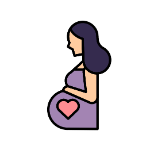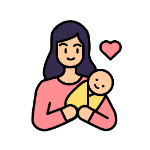
Pregnancy In Pandemic
Pregnancy During Pandemic And What To Expect
7 min read | Updated on 15-02-2022 by HappyPreggie
Preparing for an incoming newborn can be a very special time full of excitement and anticipation for many expecting couples. But with the onset of the COVID-19 pandemic, pregnancy and childbirth for women are taking place in some of the most unusual circumstances, clouding this time with fear, anxiety, and uncertainty.

New parents have also missed out on many celebrations and rituals that commemorate the transition into parenthood like baby showers, gender reveals or travelling back to their hometown to spread the good news about their newest family member. While this may be a hard time for everyone, knowing what to expect on certain things is a good step of preparation for a smoother pregnancy journey.
Pregnancy puts a mother at a higher risk of severe illness compared to people who are not pregnant. As research is still being done to determine the safety and effects of COVID-19 vaccination towards pregnant women, there is still no evidence that proves it dangerous or disadvantageous to them. For this reason, pregnant women with high exposure to COVID-19 such as health workers or those with health issues should have no problems with getting vaccinated in consultation with their health care provider.

There may be false claims and fake news all over social media, but there is no solid proof that shows if any vaccine, including COVID-19 vaccines, can affect fertility in any woman or man. If you are currently trying to conceive, you do not need to avoid pregnancy after receiving a COVID-19 vaccine.
Currently, there is still no news on whether the virus can be transmitted from a mother to her baby during pregnancy. However, it is better to take all of the necessary precautions to prevent yourself from contracting the COVID-19 virus. Make sure you seek medical care immediately and follow the instructions from your health care provider if you are feeling ill during pregnancy or after giving birth.

While policies may vary for some medical facilities, it is important to have the pregnant women’s partner nearby to support them. They can do so, as long as the proper precautions are taken, such as wearing a mask while in the delivery room and washing their hands constantly.
Having a birth plan may not always go perfectly due to the present circumstances, but it will still help make you feel more at peace by giving you a sense of control. The birth plan should include who to call when the delivery begins, who will provide support during labour, and where. Your partner or any assigned family member should also take note on what are the restrictions for hospital birth. Other than that, it is best to try and make yourself relax by doing simple things like gentle stretching, breathing exercises or even listening to soothing music.
How to protect your newborn from the COVID-19 virus?

The best action you can take is to follow the basic social distancing rules, which are staying at home with your family members and do not accept any visitors. This is a good way to spend more time with your loved ones and develop a stronger bond with your newborn. Although it is a difficult time, having this moment to get closer as a family is a very good way to stick to the restrictions without feeling bound.
Research shows that pregnant women are not at a higher risk of contracting the COVID-19 virus than any other group of people. That being said, due to changes in their body and immune system, pregnant women in the last months of pregnancy can be badly affected by some respiratory infections. Hence, it is important to take precautions. The best solution is to practice physical distancing measures such as:

Additional protective measures include wearing a mask, frequent handwashing with soap and water, regular cleaning and disinfection of frequently touched surfaces at home, self-monitoring for any signs or symptoms consistent with COVID-19, and seeking early care from a health care provider.
It is completely safe to continue breastfeeding as it is the best thing a mother can do for her baby. As of today, there is still no evidence that shows any transmission of active COVID-19 through breast milk and breastfeeding. Nonetheless, if you feel ill in any form or way, you can seek medical care early and follow instructions from your health care provider. Mothers well enough to breastfeed should take precautions, including wearing a medical mask if available, washing hands before and after contact, and cleaning/disinfecting surfaces. If you are too ill to breastfeed, proceed to breast-pumping and give it to your child via a clean cup or spoon – all while following the same precautions.

It can be challenging for pregnant women living close to lots of people like apartments or flats to maintain physical distancing. In this case, try to inform your closest neighbours about your situation so that they will know to keep their distance and take care of their surrounding hygiene.
For the millions of women who celebrated their first Mother’s Day in May 2021, their transition into motherhood has been deeply affected by the COVID-19 pandemic. The restrictions have disrupted many women’s prenatal care and forced some mothers to deliver their infants without their partner or any family support. Others even faced separation from their newborns immediately after birth. However, it is important to always stay positive and look at the brighter side during this difficult time. Family members should also give continuous support to pregnant women in the household so that they will not feel pressured or anxious about handling the pregnancy alone. Getting enough assurance from your loved ones will produce a sense of comfort to help you go through this hard time.
Want to read more? Check out these easy exercises for pregnant women and also some of the common causes for miscarriage and pregnancy loss.
(Image credits to Lola&Lykke)
New parents have also missed out on many celebrations and rituals that commemorate the transition into parenthood like baby showers, gender reveals or travelling back to their hometown to spread the good news about their newest family member. While this may be a hard time for everyone, knowing what to expect on certain things is a good step of preparation for a smoother pregnancy journey.
Can you get the COVID-19 vaccine while being pregnant?
Pregnancy puts a mother at a higher risk of severe illness compared to people who are not pregnant. As research is still being done to determine the safety and effects of COVID-19 vaccination towards pregnant women, there is still no evidence that proves it dangerous or disadvantageous to them. For this reason, pregnant women with high exposure to COVID-19 such as health workers or those with health issues should have no problems with getting vaccinated in consultation with their health care provider.
Will the vaccine affect your fertility?
(Image credits to RandCorporation)
There may be false claims and fake news all over social media, but there is no solid proof that shows if any vaccine, including COVID-19 vaccines, can affect fertility in any woman or man. If you are currently trying to conceive, you do not need to avoid pregnancy after receiving a COVID-19 vaccine.
Can the virus pass down to your baby?
Currently, there is still no news on whether the virus can be transmitted from a mother to her baby during pregnancy. However, it is better to take all of the necessary precautions to prevent yourself from contracting the COVID-19 virus. Make sure you seek medical care immediately and follow the instructions from your health care provider if you are feeling ill during pregnancy or after giving birth.
Can your partner be with you during labour?
(Image credits to PhotoDune)
While policies may vary for some medical facilities, it is important to have the pregnant women’s partner nearby to support them. They can do so, as long as the proper precautions are taken, such as wearing a mask while in the delivery room and washing their hands constantly.
How should you cope with feeling nervous during the birth process?
Having a birth plan may not always go perfectly due to the present circumstances, but it will still help make you feel more at peace by giving you a sense of control. The birth plan should include who to call when the delivery begins, who will provide support during labour, and where. Your partner or any assigned family member should also take note on what are the restrictions for hospital birth. Other than that, it is best to try and make yourself relax by doing simple things like gentle stretching, breathing exercises or even listening to soothing music.
How to protect your newborn from the COVID-19 virus?
(Image credits to MotherhoodStory)
The best action you can take is to follow the basic social distancing rules, which are staying at home with your family members and do not accept any visitors. This is a good way to spend more time with your loved ones and develop a stronger bond with your newborn. Although it is a difficult time, having this moment to get closer as a family is a very good way to stick to the restrictions without feeling bound.
How to keep yourself safe from the virus as a pregnant mother?
Research shows that pregnant women are not at a higher risk of contracting the COVID-19 virus than any other group of people. That being said, due to changes in their body and immune system, pregnant women in the last months of pregnancy can be badly affected by some respiratory infections. Hence, it is important to take precautions. The best solution is to practice physical distancing measures such as:
- Avoid contact with anyone displaying symptoms of COVID-19
- Avoid going on public transportation if possible
- Avoid large and small gatherings in public spaces, especially in closed or confined spaces
- Avoid physical gatherings with friends and family
- Avoid meeting people face-to-face and instead, use texting or online platforms to communicate
(Image credits to BostonChildrenHospital)
Additional protective measures include wearing a mask, frequent handwashing with soap and water, regular cleaning and disinfection of frequently touched surfaces at home, self-monitoring for any signs or symptoms consistent with COVID-19, and seeking early care from a health care provider.
Can you safely breastfeed your baby?
It is completely safe to continue breastfeeding as it is the best thing a mother can do for her baby. As of today, there is still no evidence that shows any transmission of active COVID-19 through breast milk and breastfeeding. Nonetheless, if you feel ill in any form or way, you can seek medical care early and follow instructions from your health care provider. Mothers well enough to breastfeed should take precautions, including wearing a medical mask if available, washing hands before and after contact, and cleaning/disinfecting surfaces. If you are too ill to breastfeed, proceed to breast-pumping and give it to your child via a clean cup or spoon – all while following the same precautions.
What should you do if you live in a crowded space?
(Image credits to TheWorld)
It can be challenging for pregnant women living close to lots of people like apartments or flats to maintain physical distancing. In this case, try to inform your closest neighbours about your situation so that they will know to keep their distance and take care of their surrounding hygiene.
For the millions of women who celebrated their first Mother’s Day in May 2021, their transition into motherhood has been deeply affected by the COVID-19 pandemic. The restrictions have disrupted many women’s prenatal care and forced some mothers to deliver their infants without their partner or any family support. Others even faced separation from their newborns immediately after birth. However, it is important to always stay positive and look at the brighter side during this difficult time. Family members should also give continuous support to pregnant women in the household so that they will not feel pressured or anxious about handling the pregnancy alone. Getting enough assurance from your loved ones will produce a sense of comfort to help you go through this hard time.
Want to read more? Check out these easy exercises for pregnant women and also some of the common causes for miscarriage and pregnancy loss.
Join the largest support network for family health and well-being. Ready to get started?
Get started
















